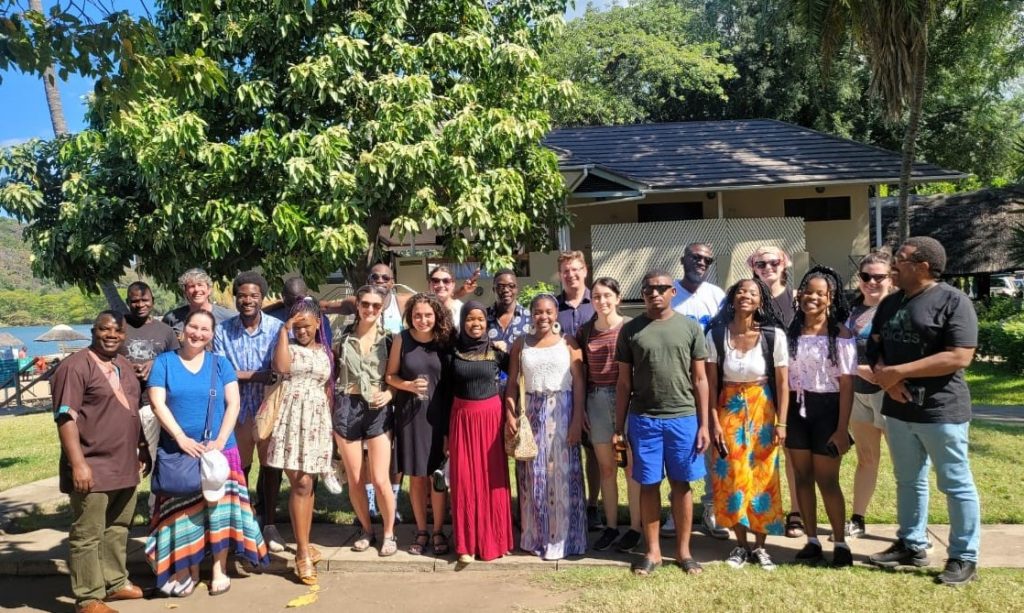Environmental Law Students Visit Malawi After Devastating Cyclone
April 02, 2024 Suzi Morales
Read about the partnership, which addresses and examines the intersection of environmental justice, human rights, and public health, in the latest issue of “CATALYST” magazine.
Tropical Cyclone Freddy devastated Malawi in February 2023, with hundreds of people reported dead and thousands displaced. The area near Lake Chilwa, Malawi’s second-largest lake, flooded. Residents in fishing communities lost their livelihoods. Standing water from the cyclone extended the malaria season. The intensity and longevity of the storm were viewed by many as indicative of climate change.
A few months later, a group of students and faculty from the University of Maryland Francis King Carey School of Law and the Chancellor College of Law at the University of Malawi visited the region. The group was part of the Environmental Justice, Human Rights, and Public Health course, a collaboration between the two schools, enabling the partners to address and examine the intersection of environmental justice, human rights, and public health from international and comparative legal perspectives. For the first time since the pandemic, Maryland Carey Law students and faculty traveled to Malawi for a 10-day trip to meet their counterparts in Malawi and see firsthand many of the issues they’d discussed during the class.
“It was heartbreaking but so valuable to visit the villages and the sites that were devastated by the cyclone,” said Margaret Bushko, JD ’23.
During the classroom portion of the course, students from both universities met weekly over Zoom. On the U.S. side, the course is co-taught by Bill Piermattei, JD ’99, professor and managing director, Environmental Law Program; Peter Danchin, JSD, LLM, LLB, professor, associate dean for research and faculty development, and co-director, International and Comparative Law Program; Robert Percival, JD, MA, professor and director, Environmental Law Program; and Diane Hoffmann, JD, MS, professor and director, Law and Health Care Program. Chikosa Banda, LLB, LLM, dean of the University of Malawi law school, co-designed the course and frequently lectures as well.
In addition to the classroom portion, groups of four or five students from both universities research specific issues and propose potential solutions. Their work product includes research papers, draft complaints, and more. For example, the team that included Maryland Carey Law student Rosemary Ardman, Class of 2024, drafted a complaint challenging the failure of the government in Zomba, the Malawian city where the university is located, to maintain its sewer system.
Site Visits in Malawi
During the trip to Malawi, the group went on site visits to areas like Lake Chilwa impacted by climate change, met with environmental justice nonprofits, and discussed the research they’d done during the course. In addition, Danchin presented the Matembo Nzunda public lecture, titled “New Directions in Environmental Justice in International Human Rights Law,” at the invitation of the University of Malawi.
“You don’t gain an appreciation of the context until you actually show up and start traveling around and talking to people and talking to environmental nonprofits and seeing the kinds of constraints they have to work under,” Piermattei said. The conversations with Malawian nonprofits, he added, have helped to refine the types of advocacy work students can undertake to assist these groups.
Read more about the partnership with Malawi and the Malawi students' visit to Baltimore, in the latest issue of CATALYST magazine.
You can read the Fall 2023 issue of CATALYST magazine, which highlights UMB's Center for Violence Prevention and its executive director; the University's three new deans; UMB's many innovations such as the School of Pharmacy training students to administer long-acting injectables; community initiatives such as the Community Engagement Center's workforce programs; UMB’s sustainability efforts to install a weather station; and much, much more!